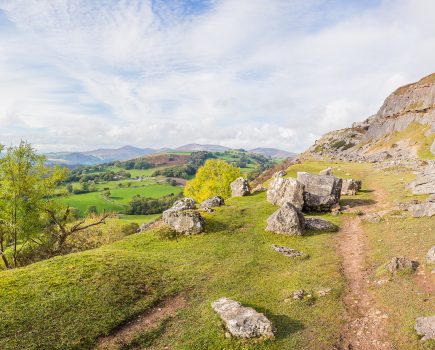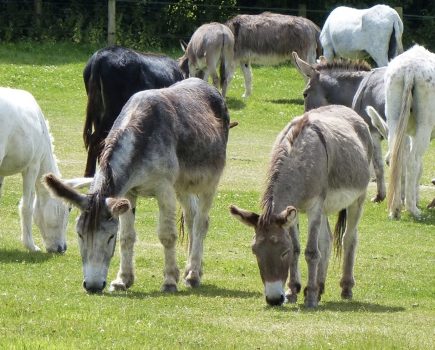A smallholder needs to know a tremendous amount of stuff.
A smallholder needs to know a tremendous amount of stuff. Lantra, the UK’s Sector Skills Council for land-based and environmental industries (www.lantra.co.uk), have recently compiled a set of skills in a weighty document, Crofters and Smallholders National Occupational Standards, in which they acknowledge “the activities of crofters and smallholders are so diverse they have been grouped into Core, Primary and Secondary activities” … phew!
Core activities include maintaining the smallholding, using equipment and machinery and marketing. Primary activities talk about growing crops, keeping animals, maintaining a woodland, and suchlike, and Secondary activities cover selling produce and running a side business such as a shop or B&B. As soon as you start to unpack simple phrases such as ‘keeping animals’, and consider all the skills that this would involve, you can understand why the document stretches to 434 pages.
Experienced smallholders have the humility to understand that there will always be something more to learn. But if you’re new to smallholding and without a background in agriculture, perhaps coming from the city like us, then you’ll encounter not so much a learning curve as a vertical take off. This is very much the situation we found ourselves in when we moved to the Brittany countryside some five years ago and we have a few suggestions about where a smallholder might go searching for useful information.
Books and magazines
This magazine will, hopefully, give you a huge amount of information about livestock, growing, machinery and a wide range of other topics. You can save money by subscribing.
Whatever the future of eBooks and electronic tablet readers, there’s something very solid and reassuring about a real book. It’s also very portable: my BTCV Fencing handbook is dirty and battered as I take it into the field with me, along with my spade and post driver. I now tend to buy most of my books via the Internet, but there is a risk of buying blind like this and I’ve had the odd disappointment. For BTCV handbooks, see: http://shop.btcv.org.uk/shop/level2/59/level
The Internet
The Web has an enormous amount of information, literally at your fingertips, and is an invaluable tool. Surf relevant websites, blogs and forums (such as the Forum on the CS site) or just type your question into a search engine. However, precisely because the Internet is so democratic, the content can be variable: not everything you read is correct and you should try and cross-reference, where possible.
Volunteering at other smallholdings
When planning to make a huge change in lifestyle, it makes sense to try before you buy. Volunteering can be a wonderful way of learning new skills and gaining valuable experience. You can get your hands dirty and help out in exchange for food and accommodation. You’ll meet new people who can become learning resources in their own right. I should add that we’ve learned loads from our volunteers!
Find out more at WWOOF (www.wwoof.org.uk) and Help Exchange (www.helpx.net) typically paying a small subscription to access the hosts.
Courses
This is one of my very favourite ways to learn! In my parents’ home town of Northampton is the excellent Moulton Agricultural College. They offer a huge range of part-time and short courses that are ideal for the busy new smallholder to drop in and learn essential skills on what is a working farm. (www.moulton.ac.uk/courses-part-time.asp) Trips to see my parents have been timed to coincide with Sheep Shearing for Beginners and Improvers and Lambing for Beginners. Paul Attard taught me how to peel a fleece off a North Country Mule according to the Bowen Method and, under the guidance of teacher Samantha Herring, using healthy animals as helpful stooges, I’ve introduced a feeding tube into a lamb, strapped a prolapse harness onto a ewe, and tied a birthing rope around a lamb’s head. This invaluable learning happens in a very safe and reassuring environment under the watchful eye of expert resident shepherd Pete Smith.
Breed society
If you’ve settled on your choice of animal, a breed society can be a source of more precise information, such as feeding regimes and finishing weight. You’ll keep up to date with newsletters and access discussion forums on their websites and be able to get in touch with other owners, so opening up a wealth of breed-specific knowledge and experience.
Defra
It’s obligatory to register your farm animals with The Department for Environment, Food and Rural Affairs (Defra), but there is a lot more to them than forming policy, enforcing regulations and generally keeping their beady eyes on everything you do. Their stated aims include supporting the farming industry, protecting biodiversity and encouraging sustainable food production and, to these ends, they publish useful guides such as ‘New Pig Keepers Guide’ and ‘Improving Lamb Survival’ easily available for free via the Internet. Their website is www.defra.gov.uk/ and enter the title of the guide (or anything else you want to learn about) in the green search box at top right.
Observation
I’ve left this to the end as I feel it’s the most important. We learn in the doing, but only if we observe carefully. Whatever you read, whatever other people tell you, you will find, for example, that your animals do something curiously different, or your tomatoes are healthy, while all around you have blight. The set-up stage of a smallholding is intensely busy, but it’s important to take the time to stop and observe. Keeping notes is an essential part of this, so you can compare conditions, for example, when trying to discover the reason for change in productivity between different years. Your knowledge of all things smallholding will grow like a rolling snowball. Increasing experience will give you a better context from which to ask the right questions. Disparate elements will coalesce into comprehension, and it’s great fun when you start to realise that you know what you’re talking about. And lastly, once you start to gain real knowledge, don’t forget to share that information with other smallholders and don’t be coy about your apparent failures, as they’ll like to know the things that didn’t work for you as much as your successes.
It’s an uncomfortable, yet unavoidable, fact that one learns from one’s mistakes. They say roughly the same thing where we live in France: ‘on apprend en faisant des erreurs’, often simply shortened to ‘on apprend en faisant’ (‘one learns in the doing’).
Writer
Stuart Anderson swapped England for France, city for coutryside. He and his wife Gabrielle have a three-acre smallholding in Brittany. See www.permacultureinbrittany.blogspot.com/







